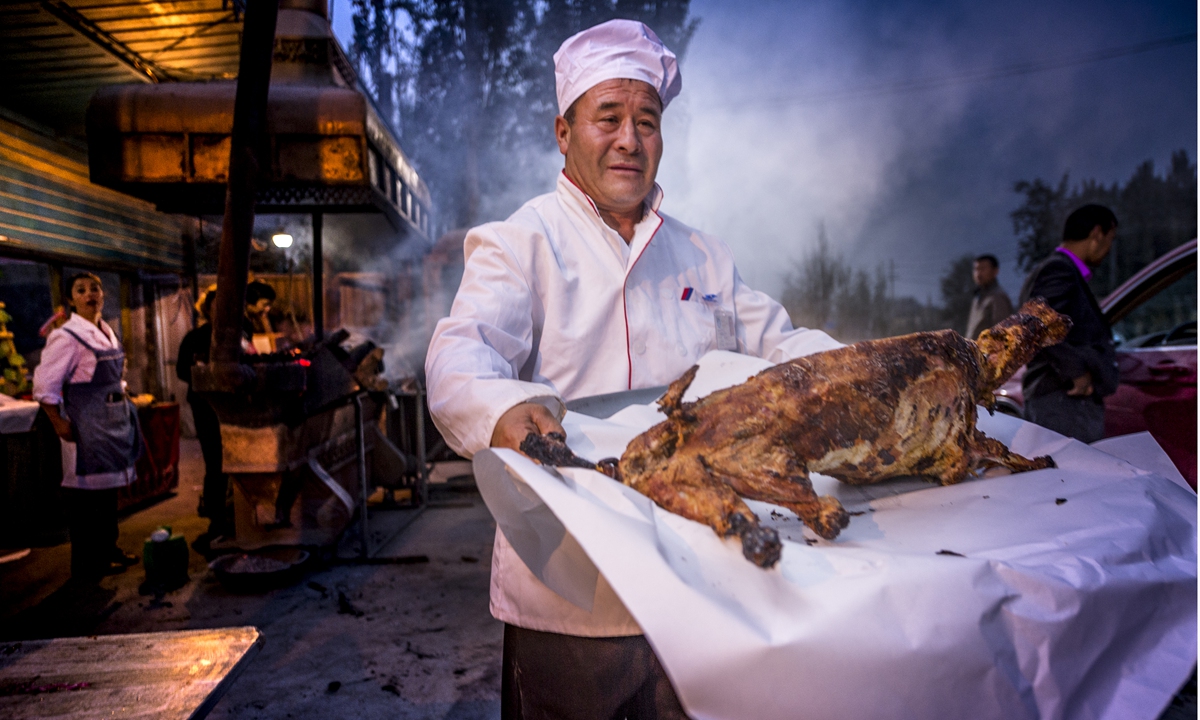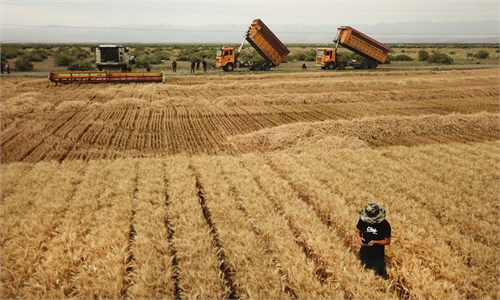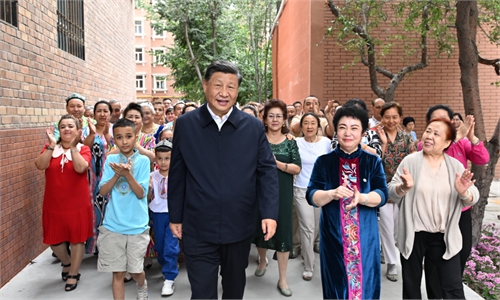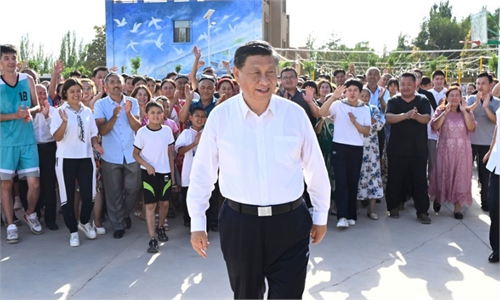NW China's Xinjiang demonstrates great economic vitality in multiple sectors, defying US' smear, crackdown
Unique status 'irreplaceable' with booming tourism, inter-continental transportation

People in Urumqi celebrate the Eid al-Adha.Photo: cnsphoto
From its buzzing tourism industry to bustling e-commerce and busy inter-continental freight transportation, Northwest China's Xinjiang region is demonstrating great economic vitality, as Chinese President Xi Jinping made an inspection trip to the northwest region last week and stressed efforts to fully and faithfully implement the policies of the Communist Party of China (CPC) for the governance of Xinjiang in the new era.The region, which lies at an ideal geographic position as the bridgehead of China's westward opening-up and a core hub for the extension of the China-proposed Belt and Road Initiative (BRI), is logging steady economic growth figures from industries and investment in the first half of the year, despite the US' economic suffocation of the region.
The tag "Xinjiang is overwhelmed by tourists from all over the country" topped the search trend on China's Twitter-like social media platform Sina Weibo on Monday, with many netizens expressing their praise for local scenery.
"We drove along the Duku Highway [which links Dushanzi to Kuqa] and the views were really awesome. However, the traffic was bad due to the high flow of tourists. It took us four hours to move 45 kilometers!" a netizen named Yinxiang said on Sina Weibo.
In the past two weeks, tourism fever in Xinjiang has climbed significantly as the summer vacation period kicks in. According to a report sent to the Global Times on Monday, Trip.com said that this summer, airline reservations to capital Urumqi have recovered to 95 percent of the same period in 2019.
Data from Mafengwo, another travel platform, showed that searches for "Xinjiang [tourism] tip" have increased by 157 percent, and searches of key words such as "Xinjiang custom tour" and "Xinjiang free tour" both rose by more than 100 percent.
"Xinjiang is the most promising region for the tourism industry in China. The government should further improve infrastructure development in order to provide tourists with a better experience," Liang Changhong, general manager of the Xinjiang company at China's CYTS Tours Holding Co, told the Global Times on Monday.

Workers are busy at the Xinjiang car plant of GAC Motor in Urumqi, northwest China's Xinjiang Uygur Autonomous Region, Sept. 24, 2020. Urumqi has made efforts to propel the transformation and upgrading of its equipment manufacturing sector. A modern industrial system with a focus on intelligent, green and customized manufacturing is gradually taking shape in the city. At present, Xinjiang is home to more than 40 enterprises of scale in developing intelligent manufacturing. (Xinhua/Wang Fei)
Livestreaming boomBesides tourism, the region is also witnessing an e-commerce boom fueled by live streaming. To capitalize on this fast growing trend, Xinjiang will hold the third e-commerce livestreaming festival next week, which will be made up of 100 livestreaming shows in five major cities across the region, including Urumqi, Kashi in the west and Hami in the east.
In the first four months, the regions' online sales totaled 90.98 billion yuan ($13.51 billion), growing 15.64 percent year-on-year. Under the boosting effect of e-commerce, online retail sales for Xinjiang agricultural products reached 5.85 billion yuan, up 22.59 percent year-on-year.
A manager from the region's e-commerce association told the Global Times on Monday that the region is making final preparations for the third livestreaming e-commerce festival, which has a great lifting effect on marketing agricultural produce such as walnuts, dates and melons directly to affluent consumers in coastal areas.
Experts said that since Xi's 2014 visit to Xinjiang, the region has experienced fundamental changes, going from disturbance to social stability over the past eight years.
In the context of continued smearing campaigns by the US and some Western countries, together with anti-China forces in recent years, which have fabricated lies such as "genocide" or "forced labor" and with the US' so-called Uyghur Forced Labor Prevention Act (UFLPA) taking effect on June 21, Xinjiang's economic prosperity bears special significance, experts noted.
In its bid to isolate the region, the US UFLPA bans products made in China's Xinjiang, which has resulted in negative spillover effects in the global supply chain, given that Xinjiang is a vital part of many global industries such as solar panel and textiles.
Amid the US economic blockade, booming business in tourism and e-commerce will help the region's efforts in finding new position in global trade, experts noted.
"The unreasonable blockade by the US and some Western countries will in turn promote the country to continue to strengthen its support for the region's economy and foreign exchanges. I believe the future development prospects of Xinjiang are definitely worth looking forward to," Liang noted.

A cook serves up a roasted whole lamb in Hotan Prefecture in Northwest China's Xinjiang Uygur Autonomous Region. Photo: VCG
Strong economic dataIn the first half of 2022, Xinjiang ran 6,195 China-Europe freight trains from its Alashankou and Khorgas ports, according to a statement sent to the Global Times by the Urumqi Bureau of the China State Railway Group Co on Monday.
Currently, some 57 regular freight train services pass through the two ports linking 19 countries and regions in Eurasia and transporting up to 200 categories of goods from daily consumer goods and electronics products to mechanical parts to countries including Germany, Poland, Belgium and Russia. In total, the region handles more than half of all China-Europe freight trains, a flagship project of the BRI.
"Xinjiang is no longer a remote corner, and the two railway ports have become vital passages for the region, which is now a core area and a hub," according to the bureau.
To capitalize on the summer tourism spree, the bureau told the Global Times that it will launch a second luxury tourist train, the Silk Road Tianshan, which rivals the New Orient Express in terms of extravagance and comfort, on Tuesday.
Despite the unreasonable smears from the US and some Western countries, Xinjiang still demonstrates its irreplaceable status for foreign enterprises.
In 2021, the actual utilization of foreign investment in Xinjiang reached $240 million, an increase of 9.5 percent year-on-year. From January to May this year, the number of newly established foreign enterprises in Xinjiang totaled 17, a year-on-year growth of 41.67 percent.
Volkswagen China's CEO Stephan Wollenstein said Friday that Volkswagen made the decision to keep its Xinjiang plant running after discussions with the company's Chinese joint venture partner, China's state-owned SAIC Group.
"We both agreed that it would be very difficult to close the plant and to open it thereafter," Wollenstein said, referring to a conversation he had with SAIC Chairman Chen Hong.
Wollenstein added that the Chinese automaker's executives told Volkswagen that if the company closed the Xinjiang plant for political reasons, it would do more harm than good.
From July 4 to 8, foreign business delegations from 13 countries came to visit Xinjiang. Delegates from Turkey, Tanzania and Malaysia said that the lies fabricated by the US and the West are absurd, as the Xinjiang they saw enjoys a good infrastructure, a fast growing economy and prosperous business. They all expressed their strong support for Xinjiang, and hoped to cooperate with the Xinjiang government, business associations and enterprises for mutual benefit, local media ts.cn reported on July 14.
Focusing on the region's development to benefit the residents of ethnic groups is the best way of debunking the lies created by anti-China forces, industry insiders said.
The manager at the e-commerce association said the success of the region's e-commerce sector is a strong rebuke to the US crackdown on the region.
"Livestreaming extended the reach of our cotton, our jade, our culture and our intangible heritage," the manager said. "As Xinjiang becomes more integrated with the internal circulation of the domestic market and becomes more prosperous, it is a strong rebuke to the US' ill intention."
Commenting on a recent US report that once again made groundless smears against the region, China's Foreign Ministry spokesperson Wang Wenbin said on Monday that US attempts to spread lies about Xinjiang and use the region as an excuse to interfere with China's domestic policy is doomed to fail.
Over the past 60 years, the total regional economy has increased 160 times, with the Uygur population growing from 2.2 million to about 12 million, and life expectancy per capita has risen from 30 years to 74.7 years, Wang said, adding that workers of all ethnic groups in Xinjiang fully enjoy the freedom to choose their jobs according to their own wishes, and fully enjoy all labor security rights and economic benefits.





